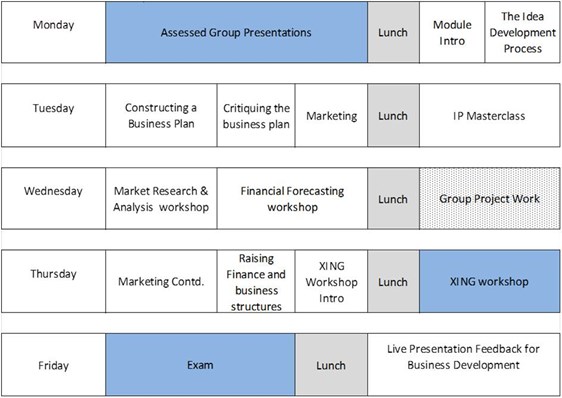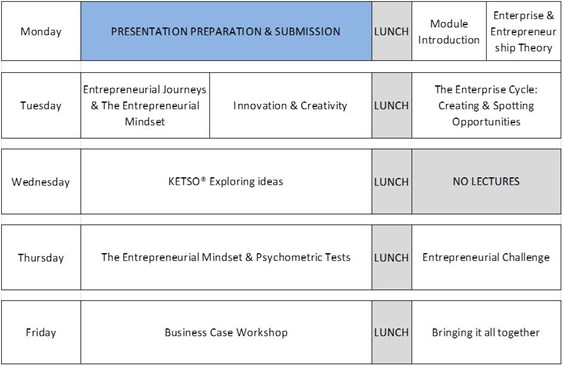Group Size
?
1.) Small group (teams of 4-6)
2.) Individual Task
3.) Large Group
4.) Any
Large Group
Learning Environment
?
1.) Lecture Theatre
2.) Presentation Space
3.) Carousel Tables (small working group)
4.) Any
5.) Outside
6.) Special
Any
QAA Enterprise Theme(s)
?
1.) Creativity and Innovation
2.) Opportunity recognition, creation and evaluation
3.) Decision making supported by critical analysis and judgement
4.) Implementation of ideas through leadership and management
5.) Reflection and Action
6.) Interpersonal Skills
7.) Communication and Strategy
1Creativity and Innovation
2Opportunity recognition‚ creation and evaluation
3Decision making supported by critical analysis and judgement
4Implementation of ideas through leadership and management
5Reflection and Action
6Interpersonal Skills
7Communication and Strategy
Objective:
‘Renewable Energy Enterprise and Management (REEM) is a unique multi-disciplinary course blending appropriate project evaluation techniques and business enterprise with awareness of the potential of renewable energy technologies. The distinctive flexible learning approach blends distance learning with intensive face-to-face weeks on campus.’
(http://www.ncl.ac.uk/postgraduate/courses/degrees/reem-msc-pgdip-pgcert/#profile)
Introduction:
Katie Wray, Lecturer in Enterprise, Newcastle University;
“In Renewable Energy there are 2 MSc options at Newcastle University, MSc Renewable Energy, Enterprise and Management (REEM) and Renewable Energy Flexible Programme (REFLEX). REFLEX is for applicants that have a hard engineering first degree: REEM is open to students from a wide range of technical and non-technical backgrounds.
Activity:
“REEM is structured as a year-long programme made up of block teaching weeks (10 credits = 1 full week of teaching plus a pre- and/or post- school assessment). The programme introduces enterprise and entrepreneurship as shown in red below.

Figure 1
“This gives the foundations at the beginning and end of each semester to ensure that the theme of enterprise and the application of the technical, project and policy modules is reinforced throughout.
“Students undertake practical enterprise training during these modules as well as undertaking an Enterprise Project dissertation, in which they undertake a business plan or feasibility study into a new opportunity for renewable energy.
“By teaching in a block week format, it is possible to simulate a boot-camp style learning experience during an intensive week, and to build good peer relationships which would otherwise not be possible outside the classroom. Some examples of the topics covered in the 2 modules are shown below.

Figure 2: SPG8015: Introduction to Enterprise and Entrepreneurship in Science and Engineering

Figure 3: SPG8016: Business Enterprise in Science and Engineering
Impact:
“The students have independently created an interest group for both REEM and REFLEX (started by someone on REFLEX) for students that are interested in enterprise and entrepreneurship. The group is like an informal society. It is based on opportunities emerging in Renewable Energy or Energy Management.
We see students applying for these programmes do so because they have identified some growth opportunities in the sector.”
Learner outcome:
These examples of curriculum development for enterprise related outcomes were originally outlined by Neil Coles at the International Enterprise Educators Conference under the heading 'From Archaeology to Zoology; an A-Z of enterprise in the curriculum'. For his work in contextualising enterprise for any subject, Neil won the 2013 National Enterprise Educator Award.
References: